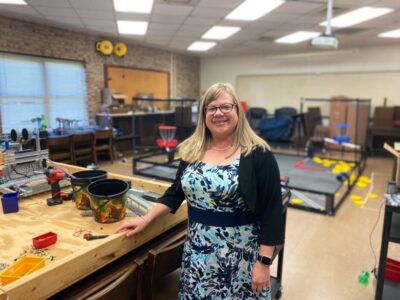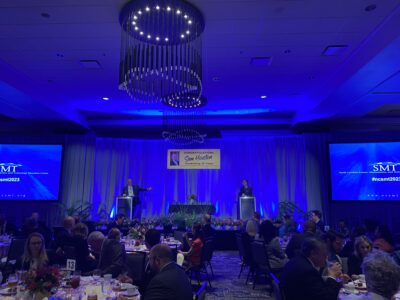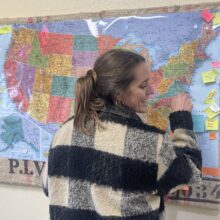|
|
Behind the Story
In this series, we are visiting the classrooms of this year’s Burroughs Wellcome Fund (BWF) Career and Science award winners. All 2023 recipients are in the western North Carolina district and will receive $175,000 for their schools. We visited the four winners over three days, documenting classroom activity and asking each educator the same questions. Our conversation below has been edited for length and clarity.
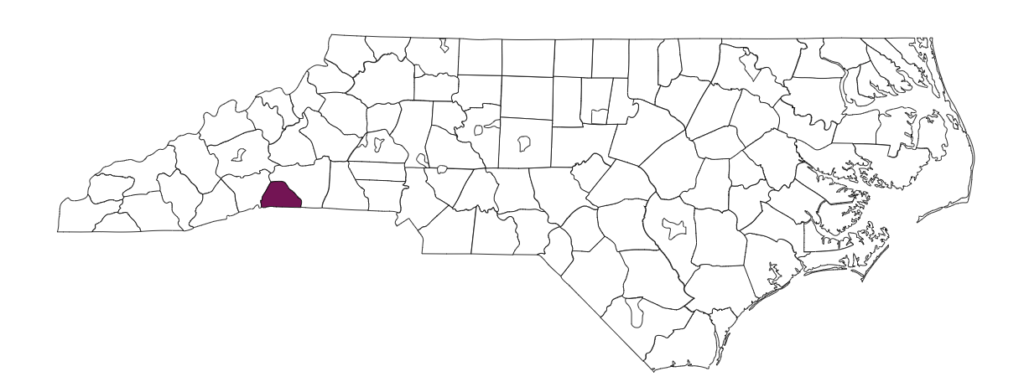
It is not snowing in the Polk Middle School library, but for a moment some students wonder if it is. Leslie Rhinehart, STEM educator and 2023 BWF Career and Award Winner, assures her students that the “white stuff” seen in their derby race slow motion videos is frozen CO2.
These seventh graders are in Rhineharts’ STEM exploratory class, racing cars they made themselves on a track that extends as long as the library itself. They are not just competing, but calculating. They are determining why some cars are faster than others, seeing STEM concepts in real time and in real life, and controlling the variables.
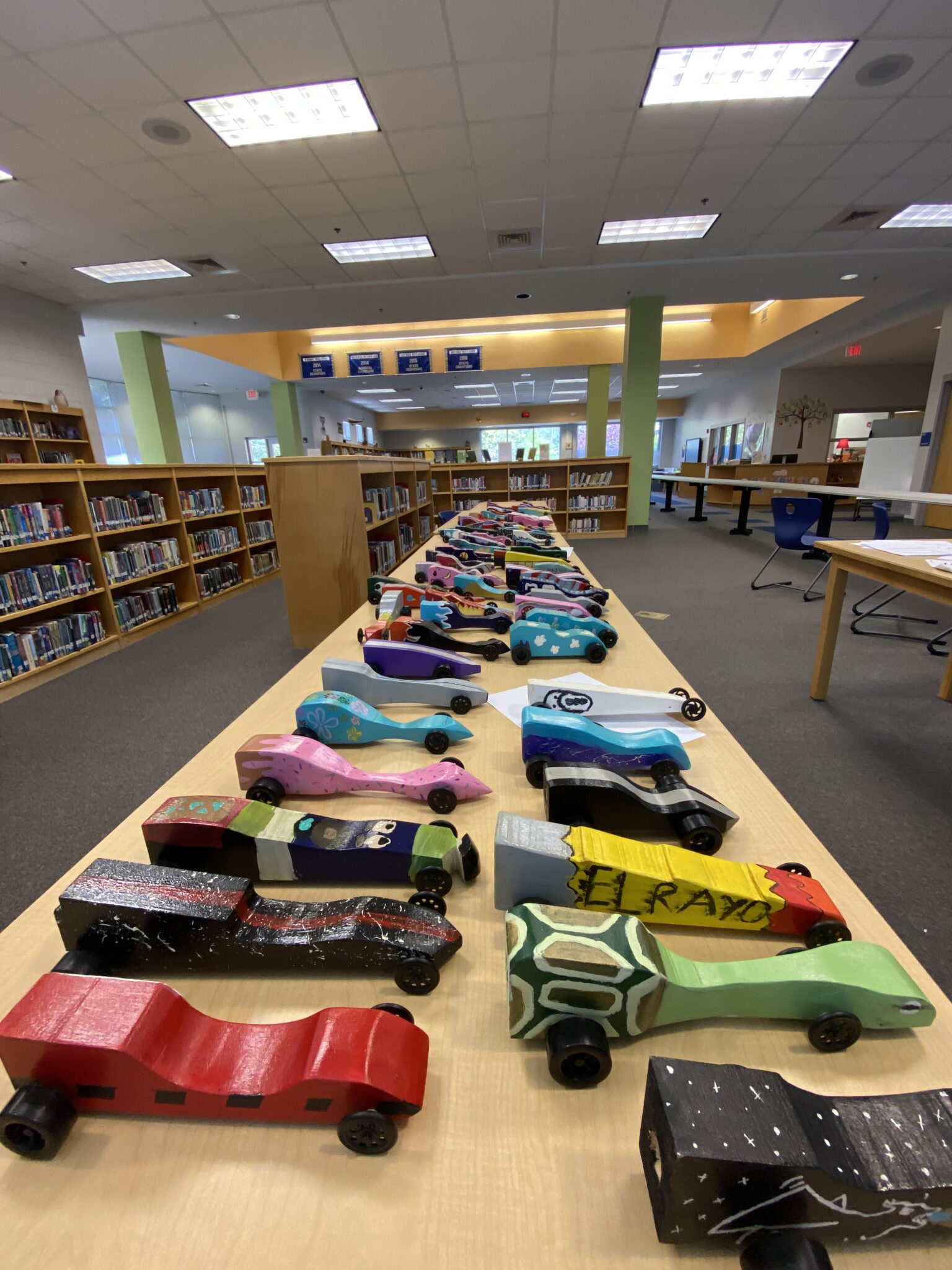
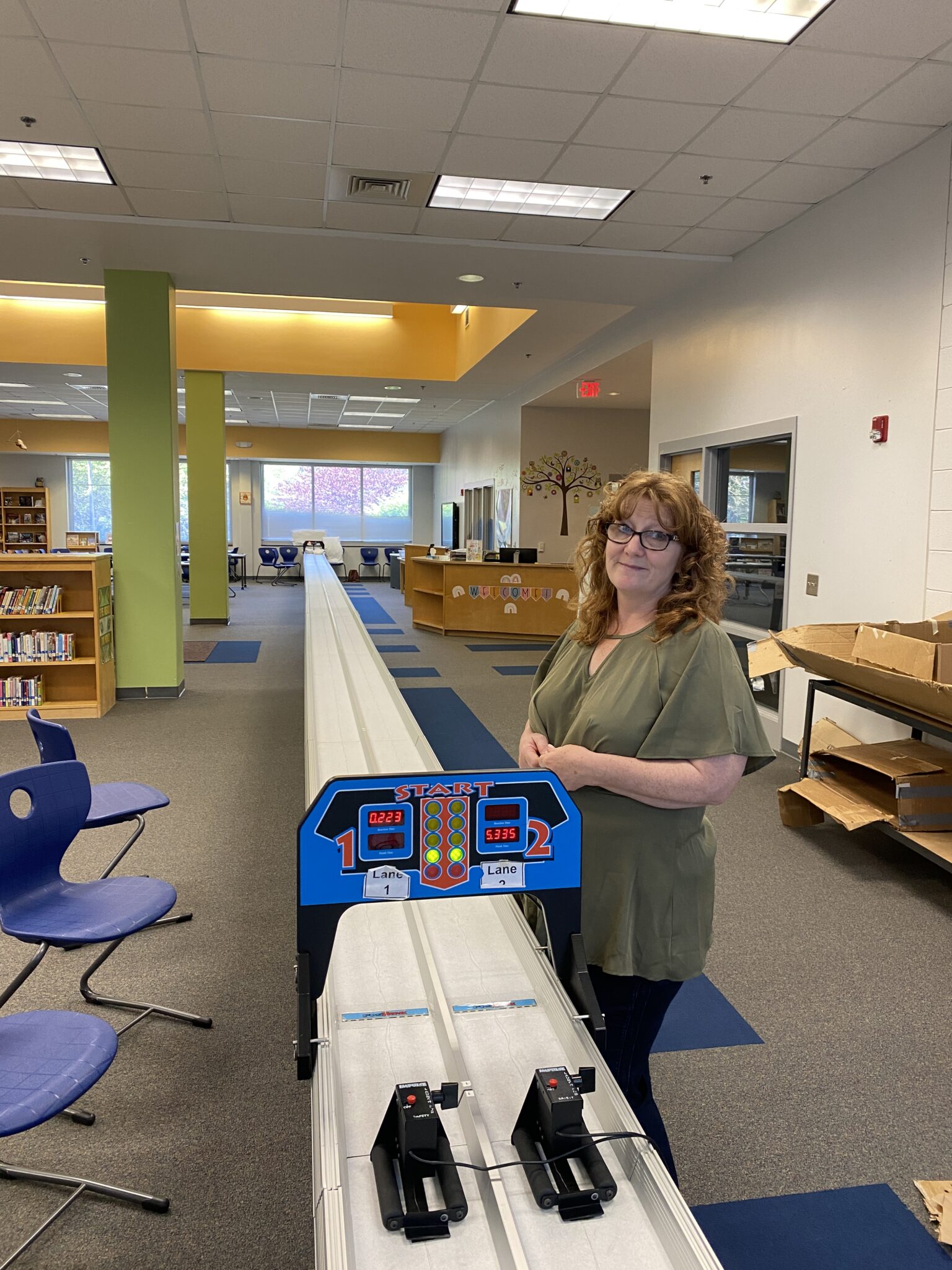
This is Rhinehart’s first year at Polk Middle School, and she gets to see every student in class at least once a year. It’s why she made the move from high school to middle school in 2022.
“I wanted to get kids before they got so into their track at the high school,” she says. “We don’t catch as many as I think we should catch (in the STEM track), especially in our minority students.”
In her new position, she hopes to change that.
With her BWF award money, she gets to bring more hands-on experiences to her students and create a library where teachers from around the district can access these lessons. This CO2 car track is just the starting line.
“STEM we know is so important because of environmental issues and because of all the science around us all day. The kids need to have a strong STEM vocabulary to understand the world around them.”
Leslie Rhinehart, STEM educator at Polk Middle School
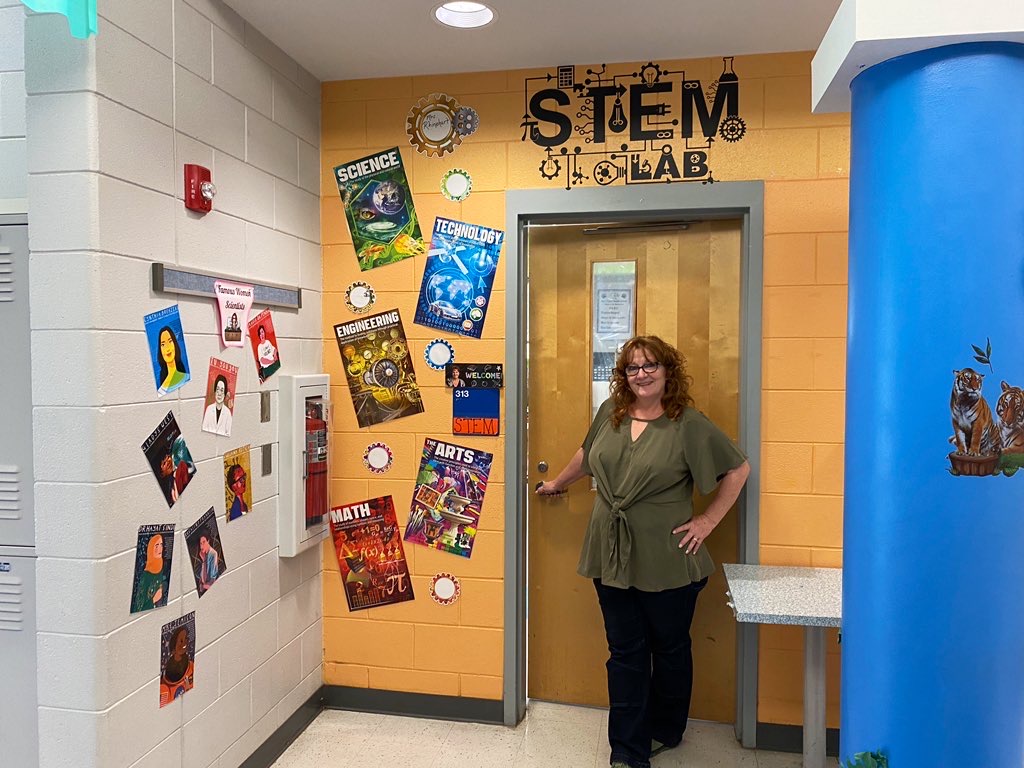
EdNC: When did you know you loved science or what made you love science?
Rhinehart: I think I’ve always loved science. I can’t remember a time I wasn’t outside looking at bugs, chasing things down, and collecting tadpoles out of the creek. My dad would even get mad because we would empty his shotgun shells so we could line up the black powder. We were always outside, always experimenting, and my dad always encouraged that.
When he was working on the tractor, he would say, “Hey, come up here and help me for a few minutes.” You know, it’s how I learned to work on things. I think that’s where the engineering mind of mine came from. It’s him constantly showing us how to fix things, how to do things. Asking, “What are you doing now? Well, come over here and do this.”
You know, we grew up on a farm and that just kind of I think accelerates it, anyway. I just can’t remember a day I didn’t enjoy science.
EdNC: What educator made the biggest impact on you and why?
Rhinehart: I think we are in different stages in our educational lives, and in those different stages, I have different reflections. So in my elementary school, it was my sixth grade teacher, Ms. Stiles, because she was one of the first teachers who actually took time out to push me.
She realized that I was getting a little bored in class, I answered everything, so she took interest in her very high-achieving students and pushed them out and gave us extra assignments. We had to go outside and build a lexicon, and she took us to the Greek Festival in Asheville. She was an amazing lady who went above and beyond.
Then I think probably when I went on to the next stage in middle school, it was probably my math teacher, Ms. Kaiser. Another teacher who was pushing us hard recognizing again, that I needed to be doing some more things.
She made an opportunity happen for me to go to a camp that would have never happened otherwise. I grew up quite poor, my parents didn’t have a lot of stuff, because I lived on a farm and all the kids. My generation was the first generation of college students. My grandparents were all illiterate, and they wanted so much education for their children.
The next generation, my parents, all graduated from high school and a couple went on to college. Then the next generation, which is my generation, they almost all have college degrees. So within two generations things changed, so education has always been very important (to me). Ms. Kaiser saw that and gave me these opportunities.
Then when I get to high school, I’d say my chemistry teacher Mr. Jones pushed us hard and would again push us towards opportunities. You see these students, you want to push them so they’ll go do more.
Then I went to UNC Asheville and it was Dr. Barr, my research advisor. I’ve built relationships with these teachers where I still speak to the ones that are still living. In fact, Dr. Barr, when he retired from UNC Asheville, he called me and said, “Hey, I’ve got some equipment. They don’t want it. I know you teach chemistry. Are you wanting it?” I said yes, of course! He brought it over, and it was probably $10,000 worth of glassware.
EdNC: Of all the things you do in class, what do you think makes the greatest impact on students?
Rhinehart: It’s the relationships that you build. Doing like my teachers did, finding (opportunities) and saying, “You really need to get to this camp, I found this camp and you need to go.” That’s what I’m trying to do with my students.
I’m like, “Hey, have you considered this? What about this?” The eighth graders right now are nervous about going to the high school, and they’re talking about their classes. And I’m encouraging them to not just think about your classes next year, but what is it you’re wanting to do, because you’re kind of setting your path now, right?
Think about what do you want to take advantage of at the high school, right? I have that lens to help them. I think it’s just building those relationships and listening to them and trying to help them navigate this world that they’re in, and it’s a very different world.
EdNC: Looking forward, what do you think will engage future generations in science?
Rhinehart: I think whether they want to be engaged with it or not, it’s the world, the Earth, the environmental impacts that we have, they’re going to have to engage in it.
We have so many things happening with the environment, the sea levels rising, and the ecosystems that are around them, and just feeding the world. Those are all here. Whether you want to be an (agriculture) student or a farmer, or you’re wanting to look at the oceans, or the energy that we need to power all of our devices.
I think whether they want to be engaged with it or not, they’re going to have to have a voice to vote correctly. They’re going to have to understand what’s around so they know how to vote. And then if they’re owning businesses, are they doing what’s right for the environment? I think all those issues are going to impact them whether they want it to or not.
And we’re going have to find a way to teach them to use their technology better and correctly.
Entertainment is fine, but you can also use it for this much cooler thing. Instead of watching TikTok videos all day, how about using your iPads to look up at the stars at night. I love all those apps they have where you can teach yourself.
It’s all about astronomy, and you can see the satellites go by, and I’ll show the kids asking, “Have you considered using this?” and just teaching them to use their technology better, and to better serve themselves. And I think that’s the best way to engage them.
Project: Hands-on STEM experiences and lending library
Rhinehart will use this award money to enhance the STEM exploratory classes at Polk Middle School, purchasing reusable kits that can be used in a variety of lessons in both her class and around school.
She will create a lending library, housed in the Polk Middle School library, for educators around the district to come check out equipment. It is important to expose not just her students, but students across the county.
This summer, she is working on training videos for all equipment to accompany the kits. She will offer in-person, one-on-one help and can also help them manage the classroom for the day.
She also hopes to use professional development funds for herself and other educators, focusing on renewable resources and environmental stewardship.
Editor’s note: The Burroughs Wellcome Fund supports the work of EducationNC.
Recommended reading
